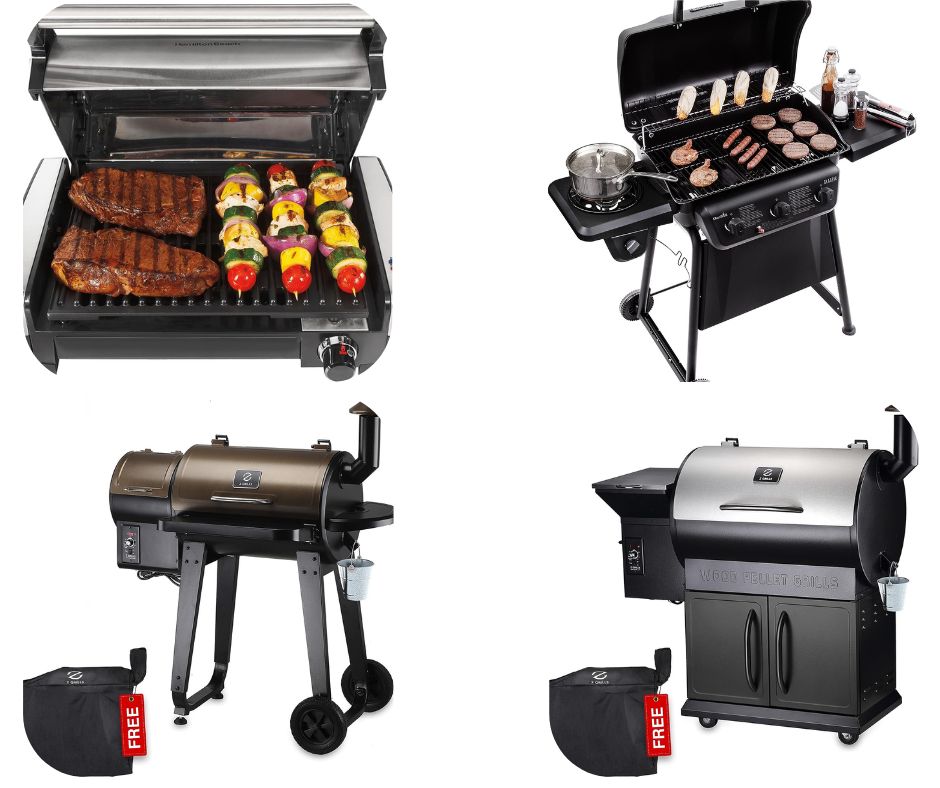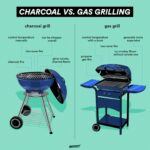
Imagine enjoying mouth-watering, perfectly grilled food every time you cook outdoors. You can turn your backyard into a culinary haven with the all-new “What Kind Of Grill Gives The Best Flavor?” product.
This innovative grill not only promises to cook your food to perfection, but it also guarantees to enhance the flavors in a way that will leave your taste buds singing. Say goodbye to bland meals, and say hello to a whole new world of flavor-packed grilling. Get ready to elevate your outdoor cooking experience with the ultimate grill that delivers on taste.
Charcoal Grills

If you’re looking for that authentic, smoky flavor in your grilled food, a charcoal grill is the way to go. Charcoal grills use charcoal briquettes or lump charcoal as the main source of fuel, which gives off a distinct smoky flavor that is loved by many grill enthusiasts.
The charcoal burns at a high temperature, allowing for a quick sear and locking in the juices of your meats. The natural flavor of the charcoal infuses into the food, resulting in that signature smoky taste that is hard to replicate.
Additionally, charcoal grills give you more control over the temperature by adjusting the placement of the charcoal or using dampers to regulate airflow. This versatility lets you achieve the perfect charred exterior and tender interior for your grilled dishes.
Pros of Charcoal Grills
One of the main advantages of charcoal grills is their ability to reach high temperatures quickly. The intense heat produced by burning charcoal allows for excellent searing, which caramelizes the surface of your meat and enhances the flavors. Charcoal grills also allow adding different wood chips or chunks to create even more complex flavors.
They use different types of wood, such as hickory, mesquite, or fruit woods, infusing your food with unique smoky undertones and taking your grilling experience to the next level. Another benefit of charcoal grills is their affordability. They tend to be less expensive than other grills, making them an excellent option for those on a budget.
Cons of Charcoal Grills
While charcoal grills offer unmatched flavor, they require more effort and time. Starting a charcoal grill can be tricky, as you need to wait for the charcoal to reach the desired temperature and evenly distribute the heat before you can start grilling.
This process can take anywhere from 20 to 30 minutes, so you must plan ahead to ensure your coals are ready when you want to cook. Charcoal grills also require regular maintenance, such as cleaning out the ashes and regularly replacing the charcoal grates.
Additionally, charcoal grills tend to produce more smoke, which can be an issue if you live in a neighborhood or apartment complex with restrictions on open flames or excessive smoke.
Gas Grills:

Gas grills offer a convenient and efficient way to grill your food without charcoal or wood. They are powered by propane or natural gas, providing a consistent heat source for cooking. Gas grills come with multiple burners that allow you to control the temperature for different cooking zones, making them ideal for grilling various foods simultaneously.
While they may not offer the same smoky flavor as charcoal grills, gas grills excel in quickly heating up and maintaining a steady temperature, making them a popular choice for busy grillers.
Pros of Gas Grills
Convenience and ease of use are the main advantages of gas grills. With just a push of a button, you can ignite the burners and have your grill ready to cook in just a few minutes. This is especially beneficial for those who want to have a spontaneous barbecue or don’t have the patience to wait for charcoal to heat up.
Gas grills also offer precise temperature control, allowing you to adjust the heat instantly to suit different types of food. Additionally, with a gas grill, there is no need to worry about running out of fuel, as you can easily replace the propane tank or connect your grill directly to your home’s natural gas line.
Cons of Gas Grills
While gas grills are convenient, they often lack the smoky flavor that charcoal or wood grills provide. However, some gas grills come with “smoker boxes” or “flavorizer bars” that allow you to add wood chips or other aromatic ingredients to infuse smokiness into your food.
Another drawback of gas grills is their initial cost. Gas grills are more expensive than charcoal grills due to their additional features and materials. Additionally, gas grills may not achieve the same high temperatures as charcoal grills, which can sometimes affect the searing capability and overall browning of certain foods.
Wood Pellet Grills
For those who value convenience and smoky flavor, wood pellet grills offer a unique grilling experience. Wood pellet grills use small wooden pellets made from compressed sawdust as their fuel source. These pellets are automatically fed into a firebox, igniting and providing heat and flavor to your food.
Wood pellet grills are known for their versatility, as they can be used for grilling, smoking, roasting, or even baking. The pellets come in various wood flavors, such as apple, cherry, hickory, or mesquite, allowing you to experiment with combinations to achieve the perfect smoky taste.
Pros of Wood Pellet Grills
One of the major advantages of wood pellet grills is their ability to provide consistent heat and smoke flavor. The automatic feeding system ensures a stable temperature throughout the cooking process, making it easy to achieve perfectly cooked meats every time.
Wood pellets are made from natural wood, without any additives or chemicals, which results in a clean and pure smoky taste. Additionally, wood pellet grills allow for greater control over temperature and smoke intensity, thanks to their digital control panels and adjustable vents. This means you can customize your grilling experience to suit your specific preferences.
Cons of Wood Pellet Grills
While many enthusiasts belove wood pellet grills, they have some drawbacks. One of the main concerns is the cost. Wood pellet grills are more expensive than charcoal and gas grills, primarily due to their advanced technology and additional features.
Wood pellets’ ongoing costs can also increase, especially if you grill frequently. Additionally, wood pellet grills rely on electricity to power their automatic feeder and control panels. This means that if you experience a power outage or don’t have access to electricity, you won’t be able to use your grill.
Electric Grills

Electric grills offer a convenient and versatile solution for those living in apartments, condos, or homes with limited outdoor space. As the name suggests, electric grills use electricity as their primary heat source. Two main types of electric grills are open grills and contact grills.
Open electric grills resemble traditional outdoor grills, with a heating element beneath a cooking grate. On the other hand, contact electric grills have a top and bottom grilling plate that presses the food between them, cooking it from both sides simultaneously.
Pros of Electric Grills
The main advantage of electric grills is their convenience and ease of use. They eliminate the need for propane or charcoal, allowing you to grill indoors or in small outdoor spaces where open flames may not be permitted. Electric grills also heat up quickly and provide even cooking temperatures, making it easy to achieve consistent results.
Unlike charcoal or gas grills, electric grills do not produce smoke, making them ideal for those sensitive to smoke or living in smoke-restricted areas. Additionally, electric grills are easy to clean, as they typically have removable grilling plates that can be washed in the sink or dishwasher.
Cons of Electric Grills
While electric grills offer convenience, they do come with some limitations. One of the main drawbacks is the lack of smoky flavor. Electric grills do not provide the same authentic smoky taste as charcoal, wood, or gas grills. However, some models come with removable drip trays filled with wood chips or herbs to add a hint of smokiness to your food.
Another issue with electric grills is their lower maximum temperature compared to other grills. This can affect the searing capability and overall browning of certain foods. Additionally, electric grills require a power source, so using them in areas without access to electricity can be challenging.
Smoker Grills

A smoker grill is the perfect choice if you’re a fan of slow-cooked, tender, and smoky meats. Smoker grills are specifically designed to cook food at low temperatures over an extended period, allowing the smoke from burning wood or wood pellets to infuse into the food, resulting in a rich smoky flavor.
Smoker grills come in various sizes and styles, from traditional offset smokers to vertical and cabinet-style smokers. They provide the ultimate BBQ experience, producing mouthwatering results that are hard to replicate with other grills.
Pros of Smoker Grills
The main advantage of smoker grills is their ability to create exceptionally tender and flavorful meats. The low and slow cooking method used in smoker grills allows for the breakdown of collagen and connective tissues in tougher cuts of meat, resulting in moist and succulent dishes. The smoky flavor from the wood creates a depth of taste that adds a unique touch to your BBQ creations. Additionally, smoker grills offer versatility, as they can be used for not only smoking but also grilling and even baking. Some smoker grills also have additional features, such as built-in temperature gauges and air vents, allowing for precise control over the smoking process.
Cons of Smoker Grills
While smoker grills produce outstanding flavor, they require more time and attention than other grills. The low and slow cooking method can take several hours, if not a whole day, depending on the type of meat and desired tenderness. This means that planning is essential when using a smoker grill.
Maintaining a consistent temperature throughout the smoking process can also be challenging, especially in colder climates or windy conditions. Properly managing airflow and maintaining an optimal smoking temperature can take some practice.
Smoker grills also tend to be larger and heavier than others, so they may not be suitable for those with limited outdoor space or who frequently need to transport their grill.
Infrared Grills
If you’re looking for a grill that can reach high temperatures quickly and evenly cook your food, then an infrared grill might be the right choice for you. Infrared grills use infrared technology to heat the grilling surface directly, resulting in faster cooking times and reduced flare-ups.
Instead of burners that heat the air around the food, infrared grills have ceramic or stainless steel searing panels that radiate intense heat to sear the surface of the meat, sealing in the juices and creating a flavorful crust.
Pros of Infrared Grills
One of the main advantages of infrared grills is their ability to reach extremely high temperatures in a short amount of time. This rapid heating allows for quick searing and locks in the food’s natural juices, resulting in tender and flavorful dishes.
Infrared grills also provide even heat distribution across the grilling surface, eliminating hot spots and ensuring that every part of your food is perfectly cooked. Another benefit is the reduced flare-ups caused by dripping fats or marinades, as the intense heat vaporizes these drippings before they have a chance to ignite.
Cons of Infrared Grills
While infrared grills offer many benefits, they may not be suitable for everyone. One of the main concerns is the cost, as infrared grills tend to be more expensive than other grills. Additionally, the intense heat infrared technology produces can take some getting used to.
It requires careful monitoring and control to prevent overcooking or burning delicate foods. Infrared grills also lack the traditional smoky flavor that charcoal or wood grills provide. However, some models come with special accessories, such as smoker boxes or wood chip trays, to help infuse a hint of smokiness into the food.
Hybrid Grills
For those who want the best of both worlds, hybrid grills offer a versatile grilling experience by combining two or more fuel sources in one unit. These grills typically use charcoal, gas, or even wood pellets, allowing you to choose the fuel that suits your cooking needs. Hybrid grills are perfect for those who want to experiment with different cooking methods or can’t decide between the flavors and benefits of different grilling techniques.
Pros of Hybrid Grills
The main advantage of hybrid grills is their versatility. You can choose between different fuel sources to achieve different flavors and cooking styles. For example, you can use charcoal for that authentic smoky taste, gas for quick and convenient grilling, or wood pellets for a combination of convenience and flavor.
Hybrid grills also offer flexibility regarding temperature control, as you can adjust the heat according to the selected fuel source. Additionally, with a hybrid grill, you don’t need to invest in multiple grills or worry about running out of a particular fuel source, as you can easily switch between them based on your preferences or the type of food you’re cooking.
Cons of Hybrid Grills
While hybrid grills provide versatility, they may not excel in one area compared to dedicated grills. For example, a charcoal-specific grill may offer better smoky flavor, while a gas-specific grill may provide more convenience.
Hybrid grills may also be more complex to operate, as you must familiarize yourself with the different fuel sources and their specific requirements. Additionally, hybrid grills tend to be larger and more expensive than single-fuel grills, so they may not be suitable for those with limited space or tight budgets.
Rotisserie Grills

For those who love the taste of rotisserie-style meats, a rotisserie grill can elevate your grilling game to the next level. Rotisserie grilling involves skewering meat onto a rotating spit, which ensures even cooking and locks in the juices, resulting in succulent and flavorful dishes. Rotisserie grills come in various sizes and styles, ranging from small attachments for traditional grills to standalone rotisserie units with multiple burners and adjustable spit heights.
Pros of Rotisserie Grills
One of the main advantages of rotisserie grills is their even cooking. The constant rotation of the meat ensures that it cooks evenly on all sides, resulting in juicy and tender results. The rotation also helps to baste the meat with its juices, enhancing the flavor and preventing it from drying.
Additionally, rotisserie grills offer versatility, as you can cook whole chickens, turkeys, or roasts and use the spit for vegetables or even desserts like rotisserie pineapple. The theatrical aspect of rotisserie grilling also adds a sense of excitement and spectacle to your outdoor cooking experience.
Cons of Rotisserie Grills
While rotisserie grills offer many benefits, they may not suit all food or cooking preferences. Smaller cuts of meat, such as steaks or burgers, may not be suitable for rotisserie grilling, as they can be challenging to secure on the spit and may not cook evenly.
Additionally, the rotation of the meat can cause the skin of poultry or the crust of certain meats to become less crispy. Rotisserie grills also require careful monitoring and occasional basting to prevent the meat from drying out or becoming too charred.
Additionally, due to the rotating spit, the cooking area of a rotisserie grill may be limited, making it challenging to cook large quantities of food at once.
Kamado Grills

Kamado grills, also known as ceramic grills or egg grills, have gained popularity recently due to their versatility and ability to retain heat. These grills are made from a thick ceramic material that insulates and holds heat exceptionally well.
The unique design of Kamado grills allows for precise temperature control, making them suitable for low-and-slow smoking, high-temperature grilling, and even baking. Kamado grills are often compared to clay ovens or tandoors, as they can reach temperatures upwards of 700 degrees Fahrenheit.
Pros of Kamado Grills
One of the main advantages of Kamado grills is their excellent heat retention and control. The thick ceramic walls of the grill trap heat, allowing for efficient fuel consumption and precise temperature regulation.
Whether you want to smoke a brisket for hours or sear a steak at high heat, a Kamado grill can handle it all. Additionally, Kamado grills are known for their versatility, as the ability to adjust airflow and temperature allows for various cooking methods.
You can smoke ribs, bake pizza, roast a chicken, or grill vegetables, all on the same grill. The ceramic material also helps to lock in moisture, resulting in juicy and flavorful dishes.
Cons of Kamado Grills
While Kamado grills offer many benefits, they may not suit all grillers. One of the main drawbacks is their weight and size. The ceramic material makes Kamado grills heavy and fragile, challenging transportation and storage. They also tend to have a larger footprint than other grills, so they may not be ideal for those with limited outdoor space.
Another consideration is the learning curve associated with using a Kamado grill. The precise temperature control and vent adjustments require some practice and experimentation to master. Additionally, Kamado grills can be more expensive than other grills due to their high-quality ceramic construction.
Comparison of Flavors

When comparing the flavors produced by different grills, it ultimately depends on personal preference and the type of food you’re grilling. Each grill type offers distinct flavors that can enhance the taste of your dishes in unique ways.
Charcoal grills are synonymous with smoky flavors, thanks to the natural combustion of charcoal and the ability to add different types of wood chips or chunks. The smoke infuses the food, creating a deep, rich taste often associated with traditional BBQ. Charcoal grills excel at producing charred exteriors and a juicy, smoky interior.
While they may not offer the same smoky flavor as charcoal grills, gas grills provide a clean and consistent taste. The absence of smoke allows the natural flavors of the food to shine through, while the searing capability of gas grills creates a nice crust on the surface. Gas grills are perfect for quick and convenient grilling without the hassle of charcoal preparation.
Wood pellet grills combine the convenience of gas grills with the smoky flavor of charcoal grills. The wooden pellets impart a distinct smoky taste to the food, and you can choose from various wood flavors to customize your grilling experience. Wood pellet grills offer consistent heat and moisture retention, making tender and flavorful dishes.
Although electric grills don’t provide a smoky flavor, they deliver clean and pure tastes. The lack of smoke allows the natural flavors of the food to be the star, perfect for those who prefer a lighter and cleaner grilling experience. Electric grills are incredibly easy to use and maintain, making them suitable for those with limited outdoor space or who are sensitive to smoke.
Smoker grills are the go-to choice for those seeking intense smoky flavors. The slow cooking process and the wood smoke infuse the food with a rich and deep taste that other grills cannot replicate. Smoker grills are perfect for low-and-slow cooking, resulting in tender, moist meats bursting with flavor.
Infrared grills prioritize the ability to quickly and evenly cook food at high temperatures. While they may not provide a smoky flavor, the intense heat creates a flavorful crust on the meat’s surface, locking in the juices and enhancing the overall taste.
Hybrid grills offer the best of both worlds by allowing you to choose between different fuel sources. This versatility allows you to experiment with different flavors and cooking techniques.
Rotisserie grills offer the unique experience of slow-roasting meats on a rotating spit. The constant rotation bastes the meat and creates a juicy and flavorful result, perfect for those who prefer the taste of rotisserie-style meats.
With their excellent heat retention and control, Kamado grills produce a distinct flavor that combines the qualities of charcoal grills and clay ovens. The ceramic construction helps to trap moisture, resulting in tender and flavorful dishes that can be achieved through various cooking methods.
In conclusion, the best grill for flavor depends on your preference and the type of food you’re grilling. Charcoal grills offer unparalleled smoky flavor, while gas grills provide clean and consistent tastes. Wood pellet grills combine convenience with a smoky flavor, while electric grills prioritize ease of use and purity of taste.
Smoker grills excel in intense smoky flavors, while infrared grills deliver quick and even cooking. Hybrid grills offer versatility, rotisserie grills provide the taste of slow-roasted meats, and Kamado grills combine the qualities of charcoal grills and clay ovens. Whichever grill you choose, each type offers its unique flavors that can elevate your grilling experience to new heights. Happy grilling!







